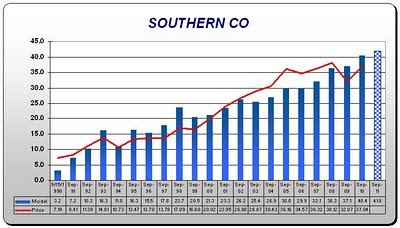 |
| Standard and Poors 500 |
The question on everyone's mind is "Does the current uptick in stocks have the muscle to push into new territory, or is it just another sucker's rally destined to flip sand in our faces once again?" It's a great question because the stock market has been trapped in a trading range for the last year. The chart at the right shows just how many attempts the S+P 500 has made to push to new intermediate highs only to be thwarted by the sellers.
In our blogs, we have spoken about the forces propelling and impeding the markets over the past few months. In many respects the negatives outnumber the positives. However the major force propelling stocks to the upside might be able to trump most of the negatives all by itself. That powerful positive force is rising earnings. If S+P 500 earnings meet their current estimates, they will have risen by nearly 33% over 2009, well above the estimates at the beginning of 2010.
We are just entering another earnings reporting period. We think earnings will again surprise to the upside, which will be the 7th quarter in a row that that has happened. But the big news is that analysts are now predicting that S+P 500 earnings for 2011 will rise over 15% above 2010. If this earnings growth does come to pass, in our minds, stocks will rise, even if the US economy continues in its funk.
Having said this, our key indicator of the potential for the market to smash through the sellers and move back toward the highs of 2007, is not earnings. They are important, but we believe there is another indicator that measures the combination of rising earnings and better "animal spirits" for investors. That indicator is the price chart of Utilities.
At the right is a chart of XLU, the Utilities exchange traded fund. We use XLU as a proxy for the average utility stock. You will notice that its recent price is attempting to break above its December 2009 high. If it is successful, we believe the whole stock market will make an assault on old intermediate highs.
Here's the reason. Utilities are a prime example of "bond-like" stocks that we have been extolling in numerous blogs. Most Utilities have solid balance sheets, a dividend yield higher than the yield on a 10-year US Treasury bond, and a long history of paying and increasing their dividends. Utilities also possess an additional feature that makes them potentially safer than the average stock: most have a monopoly or near monopoly over their product offering in a geographical area.
We have seen an incredible rally in Treasury bonds that has spread progressively to corporate bonds, municipals bonds, and junk bonds. When I saw junk bonds rallying, I knew to start watching Utilities. The Utility sector has led us out of almost every major sell off in stocks since the 1970s. I think they will do it again.
Moreover, as it becomes clear that the Utilities are breaking out, I believe you will see many other bond-like stocks also lead the way higher.
Talk of the positive qualities of dividend stocks is literally so thick you can cut it with a knife. Since we have been praising dividend stocks for 20 years, we are gratified that they are getting so much attention in the media, but we would add a caveat. Do no play dividend stocks just for the bounce. Do yourself a favor, invest in high quality dividend-paying companies for the rest of your life. Dividend investing is a way of life, not a trading strategy.
We'll keep an eye on the Utilities in the days and weeks ahead.
We own lots of Utilities. See the term of use of this site on the right sidebar.
 |
| Utilities IShares XLU |
At the right is a chart of XLU, the Utilities exchange traded fund. We use XLU as a proxy for the average utility stock. You will notice that its recent price is attempting to break above its December 2009 high. If it is successful, we believe the whole stock market will make an assault on old intermediate highs.
Here's the reason. Utilities are a prime example of "bond-like" stocks that we have been extolling in numerous blogs. Most Utilities have solid balance sheets, a dividend yield higher than the yield on a 10-year US Treasury bond, and a long history of paying and increasing their dividends. Utilities also possess an additional feature that makes them potentially safer than the average stock: most have a monopoly or near monopoly over their product offering in a geographical area.
We have seen an incredible rally in Treasury bonds that has spread progressively to corporate bonds, municipals bonds, and junk bonds. When I saw junk bonds rallying, I knew to start watching Utilities. The Utility sector has led us out of almost every major sell off in stocks since the 1970s. I think they will do it again.
Moreover, as it becomes clear that the Utilities are breaking out, I believe you will see many other bond-like stocks also lead the way higher.
Talk of the positive qualities of dividend stocks is literally so thick you can cut it with a knife. Since we have been praising dividend stocks for 20 years, we are gratified that they are getting so much attention in the media, but we would add a caveat. Do no play dividend stocks just for the bounce. Do yourself a favor, invest in high quality dividend-paying companies for the rest of your life. Dividend investing is a way of life, not a trading strategy.
We'll keep an eye on the Utilities in the days and weeks ahead.
We own lots of Utilities. See the term of use of this site on the right sidebar.

